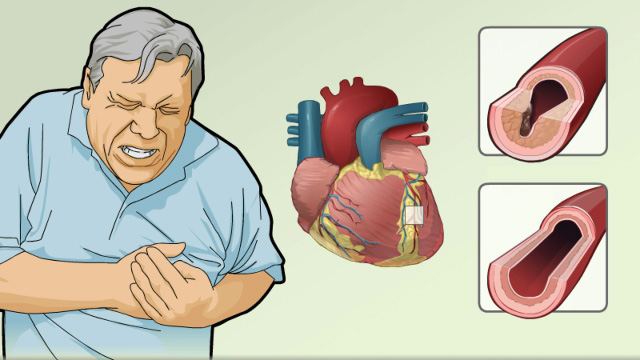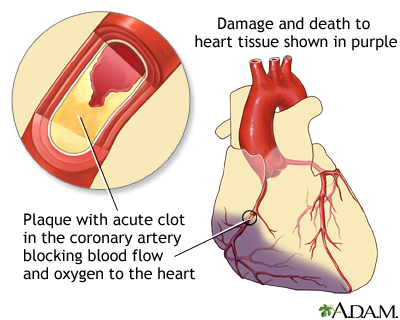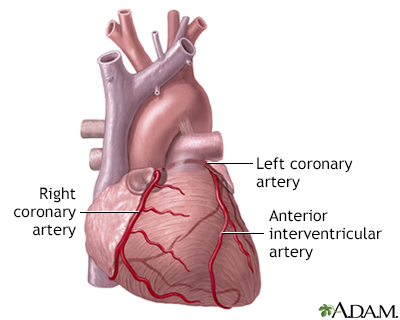Coronary heart disease
Coronary heart disease is a narrowing of the blood vessels that supply blood and oxygen to the heart. Coronary heart disease (CHD) is also called coronary artery disease.
Coronary artery disease (CAD) overview - Animation
Coronary Artery Disease (CAD) includes diseases of the arteries that supply the heart muscle with blood. It is responsible for more than half of all cardiovascular events in men and women under the age of 75 years. CAD, which is sometimes called coronary heart disease or ischemic heart disease, is most often caused by atherosclerosis. Atherosclerotic plaque forms when cholesterol and other fatty material are deposited within the arterial wall. Plaque deposits narrow the coronary arteries that supply the heart, thereby reducing blood flow to the heart muscle. If plaque ruptures, it can trigger the formation of a blood clot and completely obstructs the flow of blood to the heart. CAD also has many non-atherosclerotic causes, including genetic abnormalities of the coronary vessels, systemic vasculitis, and radiation-induced coronary disease. When coronary arteries are narrowed or blocked, oxygen-rich blood cannot reach the heart muscle, resulting in chest pain, also called angina or myocardial infarction. Over time, CAD may weaken the heart muscle and lead to serious pumping problems and abnormal heart rhythms. Therapeutic approaches for CAD include the use of 3 strategies: First, treatment to reduce the heart’s workload Second, improving coronary artery blood flow Third, slowing down or reversing the build-up of atherosclerotic plaques. The heart’s workload can be reduced by controlling the BP and using drugs such as beta blockers or calcium-channel blockers that keep the heart from pumping as hard. Coronary blood flow can be improved by surgical procedures such as a percutaneous coronary intervention or coronary artery bypass grafting. A coronary artery thrombus may sometimes be dissolved by drugs, also improving coronary circulation. Modifying the diet, exercising regularly, and appropriate pharmacological therapy can slow down or help reverse atherosclerosis.
Causes
CHD is the leading cause of death in the United States for men and women.
CHD is caused by the buildup of plaque in the arteries to your heart. This may also be called hardening of the arteries or atherosclerosis.
Hardening of the arteries
Atherosclerosis, sometimes called "hardening of the arteries," occurs when fat, cholesterol, and other substances build up in the walls of arteries. ...

- Fatty material and other substances form a plaque buildup on the walls of your coronary arteries. The coronary arteries bring blood and oxygen to your heart.
- This buildup causes the arteries to get narrow.
- As a result, blood flow to the heart can slow down or stop.
A risk factor for heart disease is something that increases your chance of getting it. You cannot change some risk factors for heart disease, but you can change others.
Risk factor for heart disease
Coronary heart disease (CHD) is a narrowing of the blood vessels that supply blood and oxygen to the heart. CHD is also called coronary artery disea...
Read Article Now Book Mark Article
Atherosclerosis
Atherosclerosis is a disease of the arteries in which fatty material is deposited in the vessel wall, resulting in narrowing and eventual impairment of blood flow. Severely restricted blood flow in the arteries to the heart muscle leads to symptoms such as chest pain. Atherosclerosis shows no symptoms until a complication occurs.
Symptoms
In some cases, symptoms may be very noticeable. But, you can have the disease and not have any symptoms. This is more often true in the early stages of CHD.
Chest pain or discomfort (angina) is the most common symptom. You feel this pain when the heart is not getting enough blood or oxygen. The pain may feel different from person to person.
Chest pain
Chest pain is discomfort or pain that you feel anywhere along the front of your body between your neck and upper abdomen.

Angina
Angina is a type of chest discomfort or pain due to poor blood flow through the blood vessels (coronary arteries) of the heart muscle (myocardium). ...

- It may feel heavy or like someone is squeezing your heart. You may feel it under your breast bone (sternum). You may also feel it in your neck, arms, stomach, or upper back.
- The pain most often occurs with activity or emotion. It goes away with rest or a medicine called nitroglycerin.
- Other symptoms can include shortness of breath and fatigue with activity (exertion), or even feeling lightheaded or passing out with exertion.
Angina causes and symptoms - Animation
Angina, or angina pectoris, is temporary chest pain or a sensation of pressure that occurs when the heart’s need for oxygen is not satisfied by the amount of blood supplied to the heart. Blood flow can be limited when the arteries are narrowed by atherosclerosis, or because of coronary artery spasms. Symptoms of angina may also include discomfort in the shoulders, inside the arms, through the back and in the throat, jaw, or teeth. Angina due to atherosclerosis usually occurs during physical exertion or emotional distress, or at rest if the artery is narrowed by more than 70%.
Some people have symptoms other than chest pain, such as:
- Fatigue
- Shortness of breath
- General weakness
Chest pain - Animation
When people have chest pain, they're often concerned they're having a heart attack. I'm Dr. Alan Greene and I'd like to talk to you for a moment about the different kinds of chest pain and when it may be an emergency. It turns out, there are lots of different kinds of chest pain. In fact, almost everything in the chest can hurt in one way or another. Some of the causes are really nothing more than a minor inconvenience. Some of them though are quite serious, even life threatening. You can have chest pain sure from the heart, but also from pneumonia. You can have chest pain from asthma. You can have chest pain from a blood clot in the lungs. It can be from nothing more than a strain of some of the muscles between the ribs, or nerves. You can also have chest pain that comes from acid reflux of from a stomach ulcer, gallstones. Many, many things can cause chest pain. You want to call 911 if you are having sudden, crushing chest pain or if your chest pain radiates into the jaw or the left arm. You want to call 911 if your chest pain also causes shortness of breath, or dizziness, nausea, or vomiting. You want to call 911 if you know you have heart disease and you do occasionally have pain but your pain is getting significantly worse than it is ordinarily. Or comes on with less activity than it does otherwise. But whatever the cause of chest pain, unless you're sure what causing it, it's worth contacting your physician to find out what may be going on. It's not a symptom to ignore.
Exams and Tests
Your health care provider will examine you. You will often need one or more tests before getting a diagnosis.
Tests to evaluate for CHD may include:
- Coronary angiography -- an invasive test that evaluates the heart arteries under x-ray.
Coronary angiography
Coronary angiography is a procedure that uses a special dye (contrast material) and x-rays to see how blood flows through the arteries in your heart....
 ImageRead Article Now Book Mark Article
ImageRead Article Now Book Mark Article - Echocardiogram stress test.
Echocardiogram
An echocardiogram is a test that uses sound waves to create pictures of the heart. The picture and information it produces is more detailed than a s...
 ImageRead Article Now Book Mark Article
ImageRead Article Now Book Mark Article - Electrocardiogram (ECG).
Electrocardiogram
An electrocardiogram (ECG) is a test that records the electrical activity of the heart.
 ImageRead Article Now Book Mark Article
ImageRead Article Now Book Mark Article - Electron-beam computed tomography (EBCT) to look for calcium in the lining of the arteries. The more calcium, the higher your chance for CHD.
- Exercise stress test.
Exercise stress test
An exercise stress test is used to measure the effect of exercise on your heart.
 ImageRead Article Now Book Mark Article
ImageRead Article Now Book Mark Article - Heart CT scan.
Heart CT scan
A computed tomography (CT) scan of the heart is an imaging method that uses x-rays to create detailed pictures of the heart and its blood vessels. Th...
 ImageRead Article Now Book Mark Article
ImageRead Article Now Book Mark Article - Nuclear stress test.
Nuclear stress test
Nuclear stress test is an imaging method that uses radioactive material to show how well blood flows into the heart muscle, both at rest and during a...
 ImageRead Article Now Book Mark Article
ImageRead Article Now Book Mark Article
Treatment
You may be asked to take one or more medicines to treat blood pressure, diabetes, or high cholesterol levels. Follow your provider's directions closely to help prevent CHD from getting worse.
Diabetes
Diabetes is a long-term (chronic) disease in which the body cannot regulate the amount of sugar in the blood.

High cholesterol levels
Cholesterol is a fat (also called a lipid) that your body needs to work properly. Too much bad cholesterol in your blood can increase your chance of...

Goals for treating these conditions in people who have CHD:
- The most commonly used blood pressure target for people with heart disease is less than 130/80, but your provider may recommend a different blood pressure target.
- If you have diabetes, your HbA1c (glycohemoglobin A1c) blood levels will be monitored and brought down to the level your provider recommends.
HbA1c
A1C is a lab test that shows the average level of blood sugar (glucose) over the previous 3 months. It shows how well you are controlling your blood...
 ImageRead Article Now Book Mark Article
ImageRead Article Now Book Mark Article - Your LDL cholesterol level will be lowered with statin or other medicines.
Treatment depends on your symptoms and how severe the disease is. You should know about:
- Other medicines used to treat angina.
Other medicines used to treat angina
Stable angina is chest pain or discomfort that most often occurs with activity or emotional stress. Angina is due to poor blood flow through the blo...
 ImageRead Article Now Book Mark Article
ImageRead Article Now Book Mark Article - What to do when you have chest pain.
What to do when you have chest pain
Angina is a type of chest discomfort due to poor blood flow through the blood vessels of the heart muscle. This article discusses how to care for yo...
Read Article Now Book Mark Article - Being active when you have heart disease.
Being active when you have heart diseas...
Getting regular exercise when you have heart disease is important. Physical activity can strengthen your heart muscle and help you manage blood pres...
 ImageRead Article Now Book Mark Article
ImageRead Article Now Book Mark Article - Eating a heart-healthy diet.
Eating a heart-healthy diet
A healthy diet is an important factor in reducing your risk for heart disease.
 ImageRead Article Now Book Mark Article
ImageRead Article Now Book Mark Article
Never stop taking your medicines without first talking to your provider. Stopping heart medicines suddenly can make your angina worse or cause a heart attack.
You may be referred to a cardiac rehabilitation program to help improve your heart's fitness.
Procedures and surgeries used to treat CHD include:
- Angioplasty and stent placement, called percutaneous coronary interventions (PCIs)
Angioplasty and stent placement
Angioplasty is a procedure to open narrowed or blocked blood vessels that supply blood to the heart. These blood vessels are called the coronary art...
 ImageRead Article Now Book Mark Article
ImageRead Article Now Book Mark Article - Coronary artery bypass surgery
Coronary artery bypass surgery
Heart bypass surgery creates a new route, called a bypass, for blood and oxygen to go around a blockage to reach your heart.
 ImageRead Article Now Book Mark Article
ImageRead Article Now Book Mark Article - Minimally invasive heart surgery
Minimally invasive heart surgery
Heart bypass surgery creates a new route, called a bypass, for blood and oxygen to reach your heart. Minimally invasive coronary (heart) artery bypas...
 ImageRead Article Now Book Mark Article
ImageRead Article Now Book Mark Article
Outlook (Prognosis)
Everyone recovers differently. Some people can stay healthy by changing their diet, stopping smoking, and taking their medicines as prescribed. Others may need medical procedures such as angioplasty or surgery.
In general, early detection of CHD generally leads to a better outcome.
When to Contact a Medical Professional
If you have any risk factors for CHD, talk to your provider about prevention and possible treatment steps.
Call your provider, call the local emergency number (such as 911), or go to the emergency room right away if you have:
- Angina or chest pain
- Shortness of breath
- Symptoms of a heart attack
Symptoms of a heart attack
Most heart attacks are caused by a blood clot that blocks one of the coronary arteries. The coronary arteries bring blood and oxygen to the heart. ...
 ImageRead Article Now Book Mark Article
ImageRead Article Now Book Mark Article - Sudden loss of consciousness
Prevention
Take these steps to help prevent heart disease.
- If you smoke or use tobacco, stop. There are many resources available to help you stop smoking or using tobacco.
Stop smoking
There are many ways to quit smoking. There are also resources to help you. Family members, friends, and co-workers may be supportive. But to be su...
 ImageRead Article Now Book Mark Article
ImageRead Article Now Book Mark Article - Learn how to eat a heart-healthy diet by making simple substitutions. For example, choose heart-healthy fats over butter and other saturated fats.
Simple substitutions
A heart-healthy diet is low in saturated fat. Saturated fat can increase your bad cholesterol and clog your arteries. A heart-healthy diet also lim...
 ImageRead Article Now Book Mark Article
ImageRead Article Now Book Mark ArticleHeart-healthy fats
Some types of fat are healthier for your heart than others. Butter and other animal fats and solid margarine may not be the best choices. Alternati...
 ImageRead Article Now Book Mark Article
ImageRead Article Now Book Mark Article - Get regular exercise, ideally at least 30 minutes five days per week. If you have heart disease, talk with your provider about starting an exercise routine.
Starting an exercise routine
Getting regular exercise when you have heart disease is important. Physical activity can strengthen your heart muscle and help you manage blood pres...
 ImageRead Article Now Book Mark Article
ImageRead Article Now Book Mark Article - Maintain a healthy body weight.
- Lower high cholesterol with lifestyle changes, and if needed, statin or other medicines.
Lifestyle changes
Your body needs cholesterol to work well. But cholesterol levels that are too high can harm you. In the US, blood cholesterol is most often measured...
 ImageRead Article Now Book Mark Article
ImageRead Article Now Book Mark ArticleStatin
Statins are medicines that help lower the amount of cholesterol and other fats in your blood. Statins work by:Lowering LDL (bad) cholesterolRaising ...
 ImageRead Article Now Book Mark Article
ImageRead Article Now Book Mark Article - Lower high blood pressure using diet and medicines.
Lower high blood pressure
Hypertension is another term used to describe high blood pressure. High blood pressure can lead to: StrokeHeart attackHeart failureKidney diseaseEar...
 ImageRead Article Now Book Mark Article
ImageRead Article Now Book Mark Article - Talk with your provider about aspirin therapy.
Aspirin therapy
Current guidelines recommend that people with coronary artery disease (CAD) receive antiplatelet therapy with either aspirin or clopidogrel. Aspirin ...
 ImageRead Article Now Book Mark Article
ImageRead Article Now Book Mark Article - If you have diabetes, keep it well-managed to help prevent heart attack and stroke.
Prevent heart attack and stroke
People with diabetes have a higher chance of having heart attacks and strokes than those without diabetes. Smoking and having high blood pressure an...
 ImageRead Article Now Book Mark Article
ImageRead Article Now Book Mark Article
Even if you already have heart disease, taking these steps will help protect your heart and prevent further damage.
Reviewed By
Larry A. Weinrauch MD, Assistant Professor of Medicine, Harvard Medical School, Cardiovascular Disease and Clinical Outcomes Research, Watertown, MA. Review provided by VeriMed Healthcare Network. Also reviewed by David C. Dugdale, MD, Medical Director, Brenda Conaway, Editorial Director, and the A.D.A.M. Editorial team.
Arnett DK, Blumenthal RS, Albert MA, et al. 2019 ACC/AHA Guideline on the primary prevention of cardiovascular disease: a report of the American College of Cardiology/American Heart Association Task Force on Clinical Practice Guidelines. [published correction appears in Circulation. 2019;140(11):e649-e650] [published correction appears in Circulation. 2020;141(4):e60] [published correction appears in Circulation. 2020;141(16):e774]. Circulation. 2019 2019;140(11):e596-e646. PMID: 30879355 pubmed.ncbi.nlm.nih.gov/30879355/.
Boden WE. Angina pectoris and stable ischemic heart disease. In: Goldman L, Cooney KA, eds. Goldman-Cecil Medicine. 27th ed. Philadelphia, PA: Elsevier; 2024:chap 56.
Marks AR. Cardiac and circulatory function. In: Goldman L, Cooney KA, eds. Goldman-Cecil Medicine. 27th ed. Philadelphia, PA: Elsevier; 2024:chap 41.
Morrow DA, de Lemos J. Stable ischemic heart disease. In: Libby P, Bonow RO, Mann DL, Tomaselli GF, Bhatt DL, Solomon SD, eds. Braunwald's Heart Disease: A Textbook of Cardiovascular Medicine. 12th ed. Philadelphia, PA: Elsevier; 2022:chap 40.
Virani SS, Newby LK, Arnold SV, et al. 2023 AHA/ACC/ACCP/ASPC/NLA/PCNA Guideline for the management of patients with chronic coronary disease: A report of the American Heart Association/American College of Cardiology joint committee on clinical practice guidelines. Circulation. 2023;148:e9–e119.
Whelton PK, Carey RM, Aronow WS, et al. 2017 ACC/AHA/AAPA/ABC/ACPM/AGS/APhA/ASH/ASPC/NMA/PCNA guideline for the prevention, detection, evaluation, and management of high blood pressure in adults: a report of the American College of Cardiology/American Heart Association Task Force on Clinical Practice Guidelines. Hypertension. 2018;72(3):e33. PMID: 29133354 pubmed.ncbi.nlm.nih.gov/29133354/.









 All rights reserved.
All rights reserved.